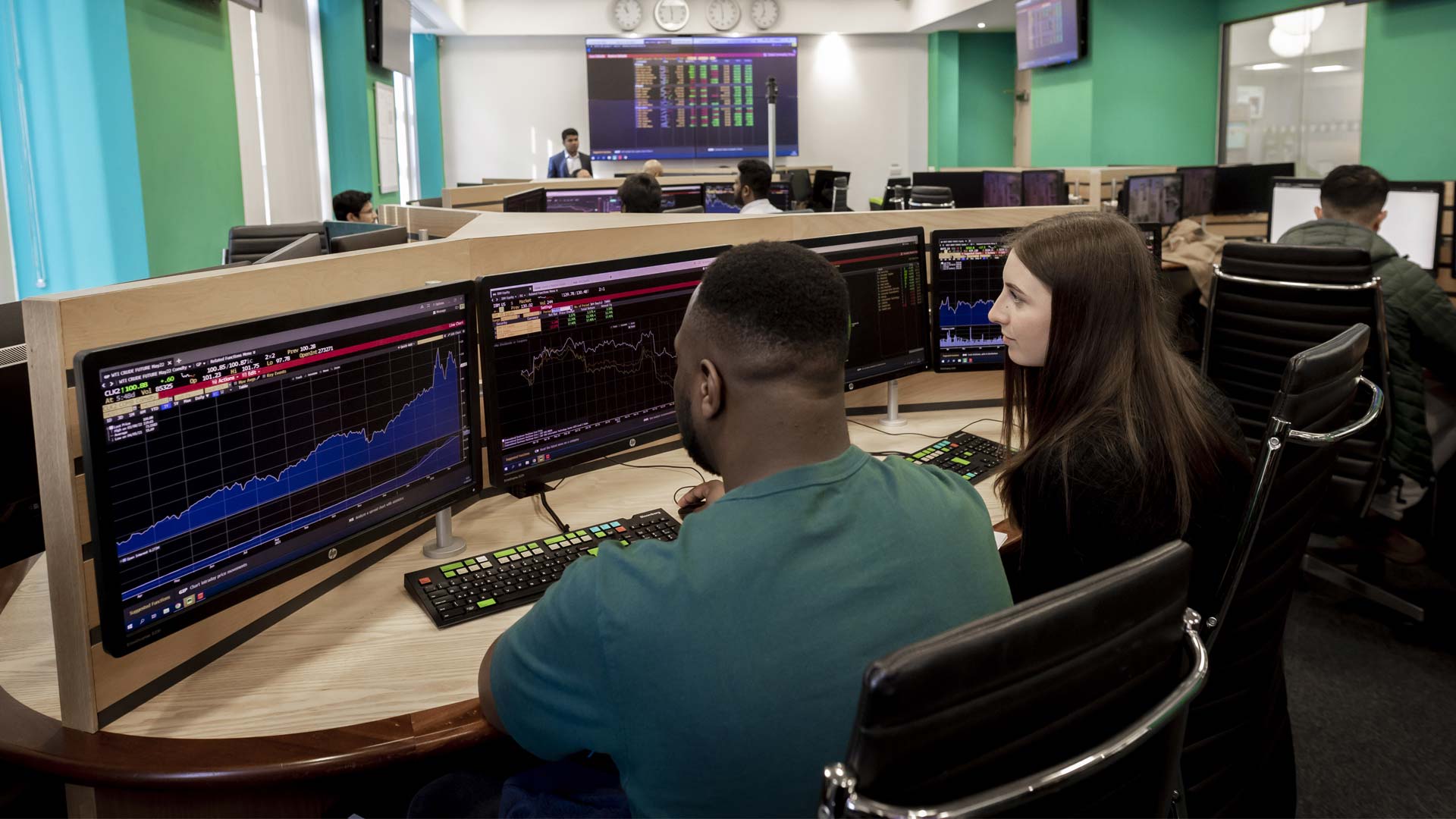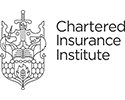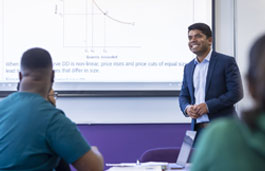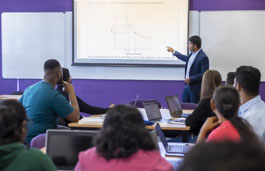Search
Financial Economics BSc (Hons)
Study level: Undergraduate
This course aims to provide a specialist focus on financial systems, such as the role of banks and the operation of stock markets, both in the UK and internationally.
Course option
Year of entry
Location
Coventry University (Coventry)
Study mode
Full-time
Sandwich
Duration
3 years full-time
4 years sandwich
UCAS codes
L111
Start date
September 2024
January 2025 - condensed
Course overview
This course covers current real-world issues and aims to help you understand how economics impacts the world of finance, businesses, financial organisations, governments and wider society.
The January start for this course is condensed in Year 1. Please see the ‘How you’ll learn’ section below for more details.
Rated Gold Overall
Teaching Excellence Framework (TEF) 20235 QS Stars for Teaching and Facilities
QS Stars University RatingsTop 5 Student City in England (Coventry)
QS Best Student Cities Index 2025Why you should study this course
By studying this course, you will have the opportunity to:
- Develop highly sought-after skills in economic analysis as well as a wide range of transferable skills relevant for a variety of career paths including those in business, finance, and the public sector.
- Tailor your studies
Our wide range of economics and finance courses share a common first year. This gives you the flexibility to decide the direction you want to take your degree after you have received a thorough grounding in economic and financial concepts and principles. This first-year experience will not only give you a clear understanding of the different paths open to you but will provide ample opportunities to discover where your talents and interests lie. - Build industry insight
Learn from experienced staff and hear from industry professionals who, in the past, have included speakers from HM Treasury, Lloyds Bank, Barclays, and the European Commission (speakers are subject to availability). - Develop practical skills in our Bloomberg Trading Floor4
Our Bloomberg Trading Floor4 is currently one of the largest academic trading floors in Europe, featuring contemporary Bloomberg terminals. You’ll also have the opportunity to gain hands-on experience using a range of economics and business software packages, and the opportunity to gain the Bloomberg Market Concepts Certificate, on successful completion of a short course (subject to availability). - Gain hands-on experience of relevant quantitative software and statistical packages
Apart from GRETL, you will also have access to market leading economic and financial databases such as the Organisation for Economic Co-operation and Development (OECD), World Economic Indicators, the Office for National Statistics (ONS), EuroStat, Refinitiv (Thomson Reuters Eikon and Datastream) and FitchConnect. - Access additional maths and stats support4
Our sigma Centre offers maths and statistics support through drop-in sessions and bookable appointments with experienced tutors. - If you choose to start this course in January you will study exactly the same course but over a slightly shorter timescale in Year 1. This is ideal if you missed the September start, want to transfer from a different university or course or just need a bit more time to prepare for life at university.
Accreditation and professional recognition

Chartered Insurance Institute
This course is recognised by the Chartered Insurance Institute (CII) for the 2024/25/26 intakes. CII recognition allows students to gain certain exemptions from some professional examinations, upon successful completion of this course (subject to application, availability, meeting applicable visa requirements and additional fees may apply). If there is any change to the recognition of this course by the CII, we would seek to notify applicants and students as soon as possible.
What you'll study
We regularly review our course content, to make it relevant and current for the benefit of our students. For these reasons, course modules may be updated.
How you'll learn
This course adopts a range of innovative teaching, learning and assessment methods such as the use of interactive teaching and learning online platforms, online quizzes, in-class feedback sessions, group projects, class experiments and bargaining simulations.
You will gain hands-on experience of relevant quantitative software and statistical packages, such as GRETL, as well as market leading economic and financial databases such as the Organisation for Economic Co-operation and Development (OECD), World Economic Indicators, the Office for National Statistics (ONS), EuroStat, Refinitiv (Thomson Reuters Eikon and Datastream) and FitchConnect.
You will also be taught in one of the largest educational trading floors in Europe, and provided with access to a wealth of live and historical trading market data.
Typically, a module involves interactive lecture(s) weekly, delivered synchronously online or on campus, followed by a range of active learning sessions such as seminars and workshops.
In addition, you will meet other students on the course and your tutors weekly during term time to engage in community-building activities, receive support and raise concerns relating to the course.
We aim to give you the opportunity to attend a range of guest lectures from industry experts who come to teach in our immersive authentic learning environments (subject to availability).
If you choose to start this course in January it will be run as a condensed programme. You’ll start your course in January and finish your first year in August. Upon successful completion of Year 1, you will progress onto Year 2 in September and then continue to start subsequent years of your course in September, completing your degree at the same time as the September starters unless you opt to do a placement year.
Teaching contact hours
We understand that everyone learns differently, so each of our courses will consist of structured teaching sessions, which can include:
- On campus lectures, seminars and workshops
- Group work
- Self-directed learning
- Work placement opportunities2.
If you would like more information, you can request information about teaching hours.
Part of university life is undertaking self-directed learning. During a typical week you will have time that allows you to work independently to apply the skills and knowledge you have learnt in taught or facilitated sessions to your projects or assignment briefs. This self-directed learning allows you to use your research skills, consolidate your knowledge or undertake collaborative group work.
As an innovative and enterprising institution, the university may seek to utilise emerging technologies within the student experience. For all courses (whether on-campus, blended, or distance learning), the university may deliver certain contact hours and assessments via online technologies and methods.
Since COVID-19, we have delivered our courses in a variety of forms, in line with public authority guidance, decisions, or orders and we will continue to adapt our delivery as appropriate. Whether on campus or online, our key priority is staff and student safety.
Assessment
This course will be assessed using a variety of methods which will vary depending upon the module.
Assessment methods include:
- Formal examinations
- Phase tests
- Essays
- Group work
- Presentations
- Reports
- Projects
- Coursework
- Exams
- Individual assignments
The Coventry University Group assessment strategy ensures that our courses are fairly assessed and allows us to monitor student progression towards achieving the intended learning outcomes.
International experience opportunities
You will have the opportunity to take part in an overseas study trip, or a full year abroad2. Coventry University aims to give you the global opportunities needed to become a truly global graduate, enhancing your employability on a global scale2.
In the past, our students have had the opportunity to visit universities in China and Malaysia to study alongside students, see how finance is taught internationally, appreciate the issues in different countries and broaden their perspectives.
Closer to home, you may have the opportunity to participate in European field trips2 which, in the past, have included events such as the annual Tax Week initiative or the annual Audit Week, both of which were conducted in collaboration with European universities, and saw students work collaboratively on related projects.
My research background is in the economics of healthcare and I am passionate about applying research to contemporary global challenges. In my teaching, I embed research findings into economic concepts, which helps to stimulate a continuous learning process beyond the classroom. Learners begin to view their environments with an economic lens and become economic advisors, seeing the real impact of economic decisions in the world around them.
Dr Judith Kabajulizi, Assistant Professor and Lecturer in Economics, 2022

I like the fact that we have seminars where we can discuss the topics and hear other students’ ideas. Additionally, I enjoy the fact that we apply economic theory to relevant real-world events that impact our lives. The course, my work experience, my involvement with societies and sports have helped enhance my ability to work in a diverse team, express my ideas and communicate with other people.
Janete Angelina Pomacal, BSc Economics (quoted 2021)

Entry requirements
Typical offer for 2024/25 entry.
Not got the required grades? We offer this degree with an integrated foundation year.
Fees and funding
2024/25 tuition fees.
| Student | Full-time | Part-time |
|---|---|---|
| UK, Ireland*, Channel Islands or Isle of Man | £9,250 per year | Not available |
| EU | £9,250 per year with EU Support Bursary** £16,800 per year without EU Support Bursary** |
Not available |
| International | £16,800 per year | Not available |
If you choose to do a work placement2, you should consider travel and living costs to cover this. There is also a tuition fee3 of £1,250 that will cover your academic support throughout your placement year.
For advice and guidance on tuition fees and student loans visit our undergraduate finance page and see the University’s Tuition Fee and Refund Terms and Conditions.
We offer a range of international scholarships to students all over the world. For more information, visit our international scholarships page.
Tuition fees cover the cost of your teaching, assessments, facilities and support services. There may be additional costs not covered by this fee such as accommodation and living costs, recommended reading books, stationery, printing and re-assessments should you need them. Find out what's included in your tuition costs.
The following are additional costs not included in the tuition fees:
- Any optional overseas field trips or visits: £400+ per trip.
- Any costs associated with securing, attending or completing a placement (whether in the UK or abroad).
Condensed course – January start date
If you choose to start this course in January please make sure you check the Fees and Finance page for more information. Although starting this course in January does not prohibit you from being eligible for student finance, the way it is paid in your first year differs from those who start their course in September.
If you start the course in January, your tuition fees will be paid in accordance with the university’s Tuition Fees, Refund and Withdrawal Terms and Conditions for January starters and for any further years of study, your fees will be paid in accordance with the terms for September starters.
*Irish student fees
The rights of Irish residents to study in the UK are preserved under the Common Travel Area arrangement. If you are an Irish student and meet the residency criteria, you can study in England, pay the same level of tuition fees as English students and utilise the Tuition Fee Loan.
**EU Support Bursary
Following the UK's exit from the European Union, we are offering financial support to all eligible EU students who wish to study an undergraduate or a postgraduate degree with us full-time. This bursary will be used to offset the cost of your tuition fees to bring them in line with that of UK students. Students studying a degree with a foundation year with us are not eligible for the bursary.
Facilities
Our facilities and technology aim to replicate what you would expect in real-world industry environments4.

The Trading Floor
The Trading Floor is an invaluable facility that allows you to get hands-on with industry-standard software. Featuring contemporary dual-screen Bloomberg terminals, the facility adds a dynamic practical element to your course.

Talent Team
Our dedicated Talent Team can assist you in applying for work placements, graduate-level jobs and offer skills development workshops. They also organise networking events to introduce you to potential employers and industry contacts.

sigma Centre
The sigma Centre is housed in our Lanchester Library, and offers maths and statistics support through drop-in sessions and bookable appointments.
Careers and opportunities
Upon successful completion, you will be able to:
- Critically evaluate modern economic theories and the empirical methods used by economists.
- Demonstrate knowledge of the workings of economic systems, both within the UK and the wider global economy, including the ability to interpret relevant data and evaluate government policies.
- Apply the theories and empirical methods of financial economics to real-world situations, by making appropriate use of data, abstraction, and logical reasoning in order to analyse the behaviour of financial markets and institutions.
- Communicate technical concepts related to financial economics and policy debates to a diverse range of audiences, and develop the ability to influence relevant stakeholders.
- Examine issues of sustainability and ethics from an economic perspective, and critically appraise the ethical and sustainability implications of economic policy.
- Integrate issues of national economic policy and analysis into a global context, and hence appreciate the value of international cooperation.
- Use a range of entrepreneurial, innovative and transferable skills, such as writing clear and concise reports based on evidence and logic, making effective use of information technology, confident delivery of presentations, creative problem solving, financial skills and self-motivation.
In addition to the financial sector, economics graduates are employed in a range of sectors and roles. They work in manufacturing, transport, communications, consulting, charitable organisations and public services such as the National Health Service (NHS).
You will have the support of the faculty’s dedicated Talent Team which has an extensive network of employers with a wide range of internship possibilities2. The Talent Team can also support you with workshops and guidance on the various aspects of the employment process such as preparing your CV, interview practice and mock assessment centres. In previous years, our TalentFest event2 has previously hosted a number of speakers from different organisations to give careers advice including KPMG, NatWest, McKinsey & Company, Fidelity International.
Where our graduates work
Upon successful completion, you should be well placed to pursue a wide variety of potential careers options in investment banking, accountancy, tax consultancy, government economists, auditing, derivatives trading, management, financial consultancy, mergers and acquisitions, and many more.
Typical roles that graduates from this course may progress to include Consultant, Business Analyst, Junior Trader or Buyer.
Further study
Alternatively, you may decide to pursue postgraduate study opportunities by studying courses such as Accounting and Financial Management MSc or Finance MSc at Coventry Business School, which could further enhance your employability. You may be entitled to an alumni discount on your fees if you decide to extend your time with us by progressing from undergraduate to postgraduate study.
Please note that further study opportunities are subject to competitive application, availability, meeting any applicable visa requirements and additional costs may apply.
Graduate Immigration Route visa
Based on current information from the UK Government, international students whose study extends beyond summer 2021 may be eligible for a visa under the UK Government’s Graduate Immigration Route, which will enable students to stay and work, or look for work, in the UK at any skill level for up to two (2) years. Check the most up to date guidance available to check your eligibility and any updates from the UK Government before making an application or enrolment decision.
How to apply
You may also like

Economics BSc (Hons)

Business Economics BSc (Hons)





